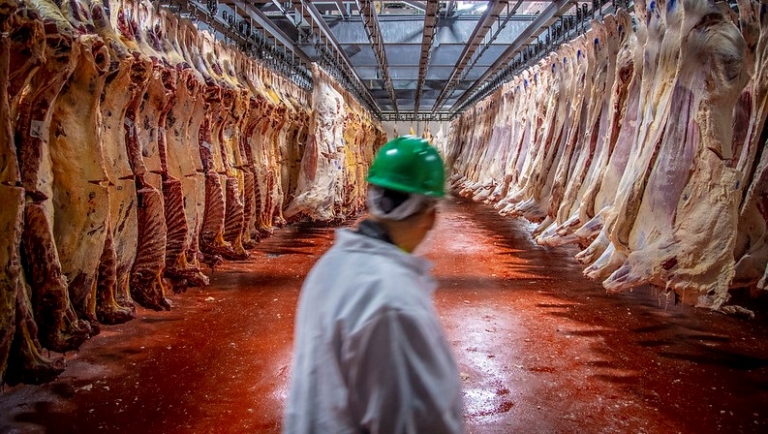Bloomberg Asks: Is Beef the New Coal?

Eleven Madison Park, a top Manhattan restaurant, is going meatless. The Epicurious cooking site stopped posting new beef recipes. The Culinary Institute of America is promoting “plant-forward” menus. Dozens of colleges, including Harvard and Stanford, are shifting toward “climate-friendly” meals.
If this continues — and the Boston Consulting Group and Kearney believe the trend is global and growing — beef could be the new coal, shunned by elite tastemakers over rising temperatures and squeezed by increasingly cheap alternatives.
“Beef is under a whole lot of pressure,” said Anthony Leiserowitz, director of Yale University’s Program on Climate Change Communications. “It was the shift in market forces that was the death knell for coal. And it’s the same thing here. It’s going to be the shift in consumer tastes and preferences, not some regulation.”
Americans do claim to want a shift. Seventy percent say it would be healthier if the country ate less meat and 58% would like to eat more fruits, vegetables, nuts and whole grains, according to a report by the food market research firm Datassential. Worries about climate pile on top of long-standing health concerns about red meat.
A few observations:
This is wonderful news, anyway you slice it, pun intended. The production of beef is what’s driving the destruction of our forests and their capacity to sequester CO2.
Obviously, this trend, if it happens at all, will be the result of consumer tastes, rather than government regulation. Well, maybe “obviously” is incorrect because a huge number of Trump supporters believed the ridiculous notion that Joe Biden was going to limit all Americans to four pounds of meat per year. But yes, consumer tastes, whether they derive from concerns about health, environmentalism, or humanitarianism, will be behind whatever happens here.
What people say they will do in surveys has very little bearing on what they actually do in practice. This is something we’ve known for as long as market research has existed on this planet. 80% of people say they would pay extra for eco-friendly products, but only about 15% do so in their real-world shopping.
Though I don’t share Bloomberg’s optimism re: the pace at which this is proceeding, it’s good news nonetheless.
